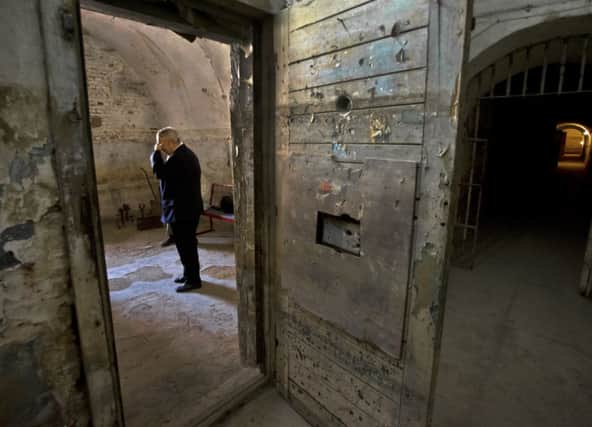Former Romanian prison governor stands trial


Alexandru Visinescu will be charged with being responsible for the torture and murdering of prisoners considered a threat to the country’s old order.
Survivors of the regime say the delay in bringing perpetrators to justice was a cynical tactic by Romania’s new rulers, some of whom held senior positions under the Communist regime, to avoid accountability.
Advertisement
Hide AdAdvertisement
Hide AdVisinescu has been accused of crimes against humanity for deaths that happened under his command at Ramnicu Sarat prison from 1956 to 1963. Since authorities brought charges against him, Visinescu says people in the street have attacked him. He has pleaded not guilty and says he’s been made a scapegoat.
It is believed that more than 100,000 prisoners deemed enemies of the communist state died in prisons in Romania in a single decade.
“I only followed orders. They should ask those that gave the orders,” he said. “I am convinced they will do anything to take revenge. Why didn’t they put me on trial in 1964 [when the political prisons closed]? Or after [Communist leader] Nicolae Ceausescu died? Why now?”
He contests the number of deaths that prosecutors say happened under his command and denies mistreatment happened under his command that led to prisoners’ deaths. The word “criminal” is scrawled on the outside wall of the building where he lives in a shabby one-room apartment, full of old photographs of him in uniform and as a young boy.
He seems more resigned than he was a year ago when he cursed and lunged at reporters after hearing charges against him and says he expects to go to prison. Another former prison guard was charged in 2000 with aggravated murder, but died before his trial could get underway.
Former ministers, diplomats, army officers, farmers, priests and workers considered a threat to the Communist regime were locked up in prisons from 1948 to 1964. Historians say one-fifth of the 500,000 who were incarcerated died.
Former prisoner Valentin Cristea, who was incarcerated in Ramnicu Sarat while Visinescu was commander, communicated by Morse code in the grim lockup where prisoners were mainly kept in solitary confinement and banned from communicating.
Mr Cristea, 84, said he learned that the inmate in the neighbouring cell, former army officer Jenica Arnautu, had gone on hunger strike to protest mistreatment and was being force-fed with a tube down his throat. In November 1959, three days after the tapping on the wall stopped, Mr Arnautu, who was 36, died, Mr Cristea said in an interview from his home in Campina, 50 miles north of the capital, Bucharest. Visinescu denied knowledge of the case.
Advertisement
Hide AdAdvertisement
Hide AdProsecutors say 14 people died under Visinescu’s command, and said corpses showed signs of malnutrition according to doctors who signed the death certificates. They accuse Visinescu of denying medical treatment and postponing the hospitalisation of gravely sick prisoners.
“The regime did not allow for the minimum survival conditions in the long term,” the indictment said.
“Prisoners died in a long drawn-out process, that was nonetheless efficient, in which they were tortured physically and mentally,” were denied food, and were physically punished on the slightest pretext, the indictment says. Visinescu says fewer died.
A probe ordered by the Communist government in 1968 into the prisons concluded the state had installed “a regime to exterminate political prisoners.”